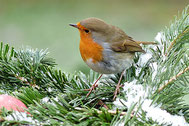Lo! in the orient when the gracious light
Lifts up his burning head, each under eye
Doth homage to his new-appearing sight,
Serving with looks his sacred majesty;
And having climb'd the steep-up heavenly hill,
Resembling strong youth in his middle age,
Yet mortal looks adore his beauty still,
Attending on his golden pilgrimage:
But when from highmost pitch, with weary car,
Like feeble age, he reeleth from the day,
The eyes, 'fore duteous, now converted are
From his low tract, and look another way:
So thou, thyself outgoing in thy noon:
Unlook'd on diest, unless thou get a son.
Lo! = Look! 、the orient = the east 東方
gracious light = regal sun 仁慈深き王の様な太陽
under eye 地上の人間の瞳、doth homage 敬意を払う
Serving = Worshiping、looks (崇敬する)眼差し
mortal (神と対比して)人間、still = continually ずっと
Attending (宮廷人が王侯にするように)仕える
golden pilgrimage = shining journey 太陽の黄道を指して
highmost pitch = highest point (太陽の)天頂 、weary 疲れ果てた
car = chariot (ギリシャ神話)二輪戦闘馬車・チャリオット
feeble age 老齢、reeleth よろめく
'fore = before 以前は、duteous = dutiful 忠実な
converted = turned away (目が)そらされて、そっぽを向かれて
low tract = low track(太陽の)低い軌道
noon = zenith (人生の)頂点・絶頂
unlooked on = unnoticed, not cared for 顧みられることなく
diest = die + est(古英語・二人称単数形の接尾辞)
参考:The Sonnets (The New Cambridge Shakespeare)
ソネット7番の朗読です。Read by me.


コメントをお書きください